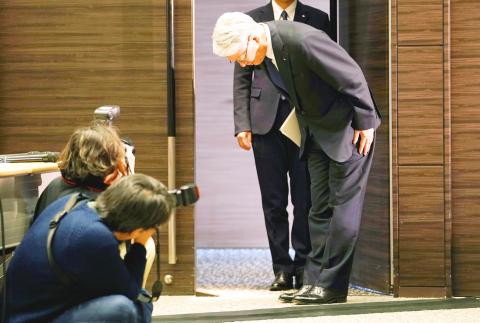The head of scandal-hit Japanese steelmaker Kobe Steel yesterday announced his resignation after the firm submitted false strength and quality data for products shipped to hundreds of clients worldwide.
Hiroya Kawasaki’s resignation was a new blow to the reputation of Japan Inc after similar quality-control scandals hit industrial titans ranging from carmaker Nissan to Mitsubishi Materials.
Following a deep and prolonged bow in apology, Kawasaki told reporters: “As I think it’s best to go ahead quickly with reforms under new members, I ... will step down from president on April 1 this year.”

Photo: AP
“We have caused trouble to many people. As soon as we can, we would like as many people as possible to think that Kobe Steel has changed,” added Kawasaki, who had been in the job since 2013. “I’m really sorry.”
The firm has not yet named a successor, but pledged to hold a board meeting “in the near future” to select someone to turn the ship around.
A long-awaited report revealed that the scandal was more widespread that first thought, with 163 more clients affected than initially identified.
The document drew the veil on a Web of falsification at various levels of the company, a venerable old firm that once employed Japanese Prime Minister Shinzo Abe.
“We take it very seriously the fact that the misconduct took place at many locations within the Kobe Steel group,” the report said.
The investigation found staff — including in some cases executives — changed inspection data, or made up data, before shipping their products.
Kobe Steel has “deep-seated issues” relating to its corporate culture and compliance, the report said.
“For over 112 years since its founding, the Kobe Steel group has managed its business by valuing the trust of its customers... The recent loss of such trust is truly regrettable,” the report added. “We will go back to our roots ... and commit ourselves to making this moment a true turning point.”
Senior executive Makoto Mizuguchi told reporters it was the firm’s “understanding” that the misconduct stretched back as far as the 1970s.
Kobe Steel vowed to overhaul its compliance procedures and internal structures, ensuring one-third of the board are independent outside directors.
In addition to the resignation, all company directors will have their pay docked by between 10 and 50 percent for a period ranging from one to four months.
The products affected by the scandal included steel wires used in car engines and tires, as well as aluminum used to manufacture Japan’s famous bullet trains.
The firm, founded in 1905, has been at pains to stress there are no safety issues arising from the fake data.
Executives have previously warned of “extraordinary losses” from the scandal, which reportedly affected more than 30 foreign companies, including Boeing Co, Airbus SE and General Motors Co.
Kobe Steel stock has lost about 18 percent since the affair broke in early October last year.

CAUTIOUS RECOVERY: While the manufacturing sector returned to growth amid the US-China trade truce, firms remain wary as uncertainty clouds the outlook, the CIER said The local manufacturing sector returned to expansion last month, as the official purchasing managers’ index (PMI) rose 2.1 points to 51.0, driven by a temporary easing in US-China trade tensions, the Chung-Hua Institution for Economic Research (CIER, 中華經濟研究院) said yesterday. The PMI gauges the health of the manufacturing industry, with readings above 50 indicating expansion and those below 50 signaling contraction. “Firms are not as pessimistic as they were in April, but they remain far from optimistic,” CIER president Lien Hsien-ming (連賢明) said at a news conference. The full impact of US tariff decisions is unlikely to become clear until later this month

GROWING CONCERN: Some senior Trump administration officials opposed the UAE expansion over fears that another TSMC project could jeopardize its US investment Taiwan Semiconductor Manufacturing Co (TSMC, 台積電) is evaluating building an advanced production facility in the United Arab Emirates (UAE) and has discussed the possibility with officials in US President Donald Trump’s administration, people familiar with the matter said, in a potentially major bet on the Middle East that would only come to fruition with Washington’s approval. The company has had multiple meetings in the past few months with US Special Envoy to the Middle East Steve Witkoff and officials from MGX, an influential investment vehicle overseen by the UAE president’s brother, the people said. The conversations are a continuation of talks that

CHIP DUTIES: TSMC said it voiced its concerns to Washington about tariffs, telling the US commerce department that it wants ‘fair treatment’ to protect its competitiveness Taiwan Semiconductor Manufacturing Co (TSMC, 台積電) yesterday reiterated robust business prospects for this year as strong artificial intelligence (AI) chip demand from Nvidia Corp and other customers would absorb the impacts of US tariffs. “The impact of tariffs would be indirect, as the custom tax is the importers’ responsibility, not the exporters,” TSMC chairman and chief executive officer C.C. Wei (魏哲家) said at the chipmaker’s annual shareholders’ meeting in Hsinchu City. TSMC’s business could be affected if people become reluctant to buy electronics due to inflated prices, Wei said. In addition, the chipmaker has voiced its concern to the US Department of Commerce

STILL LOADED: Last year’s richest person, Quanta Computer Inc chairman Barry Lam, dropped to second place despite an 8 percent increase in his wealth to US$12.6 billion Staff writer, with CNA Daniel Tsai (蔡明忠) and Richard Tsai (蔡明興), the brothers who run Fubon Group (富邦集團), topped the Forbes list of Taiwan’s 50 richest people this year, released on Wednesday in New York. The magazine said that a stronger New Taiwan dollar pushed the combined wealth of Taiwan’s 50 richest people up 13 percent, from US$174 billion to US$197 billion, with 36 of the people on the list seeing their wealth increase. That came as Taiwan’s economy grew 4.6 percent last year, its fastest pace in three years, driven by the strong performance of the semiconductor industry, the magazine said. The Tsai